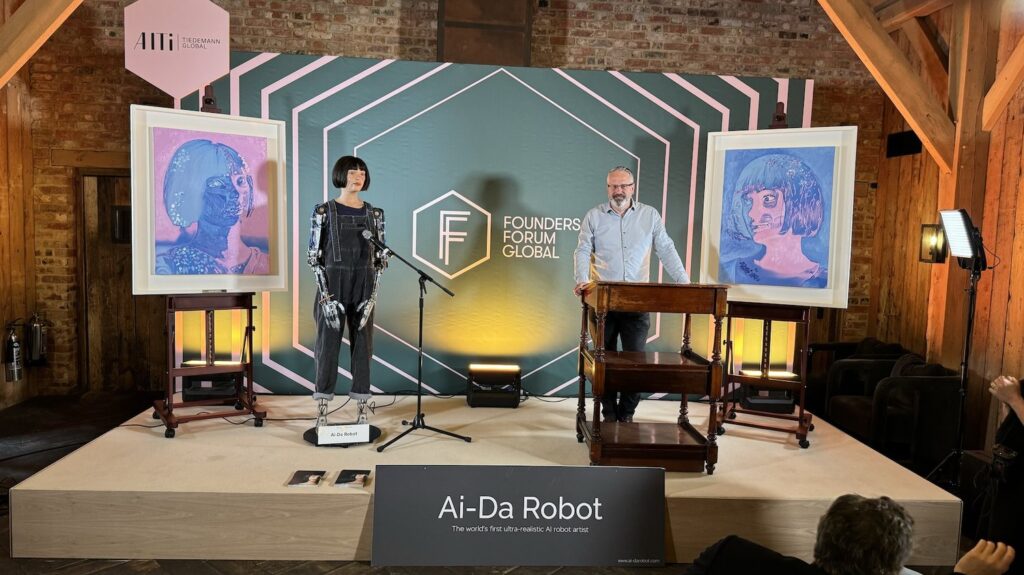Ai-Da, the world’s first humanoid artistic robot, has just set a historical record by selling its work AI God for $1.1 million during an auction at Sotheby’s. The work, which depicts a portrait of Alan Turing, the father of modern computing, far exceeded initial expectations, demonstrating not only the growing impact of artificial intelligence in the art world, but also the increasing demand for works created by intelligent machines. This event marks a milestone in the creativity debate, raising questions about the fusion of human and machine ingenuity.
The technology behind Ai-Da’s art
Ai-Da is a humanoid art robot developed to explore the boundary between art and artificial intelligence. Created in 2019 by Aidan Meller‘s team, Ai-Da is designed to mimic human creative activity using a combination of artificial intelligence (AI), machine learning algorithms and an extremely precise robotic arm. Its computational vision technology allows it to analyse and interpret images, while AI algorithms are used to create works ranging from painting to sculpture and performance. Ai-Da uses AI to generate artistic traces through the analysis of visual data, ensuring that his art is not just the result of programmed inputs, but a complex and creative reaction to the world around him. Ai-Da’s robotics is integrated with a learning system that allows it to progressively improve in the production of artistic works (click here to see the complete exhibition), addressing contemporary issues such as identity, surveillance and the relationship between man and machine.

A global success
The auction attracted 27 competitive bids from around the world, reflecting the growing interest in new forms of creativity powered by artificial intelligence. The sale represents not only a record for a work created by a humanoid, but also a moment of reflection for the art world, prompting exploration of the boundaries between human and technological creativity.
‘This sale is not just about art, but about the interaction between society and technology in the digital age,’ said Aidan Meller, director of the Ai-Da project. ’The work AI God is not just a tribute to Alan Turing, but an invitation to reflect on how artificial intelligence is transforming every aspect of our lives.’
Previous exhibitions and works
Ai-Da, created in 2019, has already exhibited his works at prestigious international events. Among her most significant participations:
- At the Venice Biennale, where she presented works inspired by the metaverse and the works of Dante.
- At the Pyramids of Giza, with a sculpture that explored the implications of CRISPR technology.
- At the Ashmolean Museum, where he recited poetry based on algorithms derived from the Divine Comedy.
- On the occasion of Queen Elizabeth II’s Platinum Jubilee, Ai-Da created a unique portrait, Algorithm Queen.
These exhibitions have attracted millions of visitors, cementing his role as an artist and a catalyst for global discussions on AI.
The cultural impact of Ai-Da
Ai-Da’s work challenges the public to reconsider the concept of creativity in the machine age. Using integrated cameras, complex algorithms and a robotic arm, Ai-Da creates works that explore issues such as digital identity, surveillance and ethics in the use of artificial intelligence.
‘I work to raise fundamental questions about the interaction between man and machine,’ Ai-Da explained. “My art is a means to reflect on changes in our society” – Ai-Da.
An evolving future of art
The record sale of AI God represents a turning point, indicating that art created by AI is not just a temporary phenomenon, but a new dimension of artistic expression. With further exhibitions and projects in the pipeline, Ai-Da will continue to push the boundaries of creativity and stimulate a global debate on the ethical and cultural implications of technology.
This extraordinary event reminds us that the future of art is not only ‘human’, but a fusion of intuition, innovation and artificial intelligence.